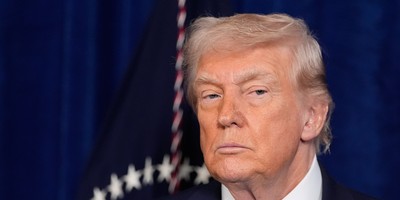WASHINGTON -- Intentional or not, it sizzled with symbolism that President Obama announced his re-election campaign the same day his administration threw in the towel on the closing of Guantanamo Bay. Attorney General Eric Holder announced that Khalid Sheik Mohammed and four others would be tried by a military tribunal at the prison Obama once described as a violation of "core constitutional values." A central pledge of one campaign was abandoned to kick off the next.
This reversal was soon followed by a budget agreement that Obama described as the "biggest annual spending cut in history" -- leaving his progressive base wounded and abandoned on the budget battlefield. The man that liberals elected to complete the work of Lyndon Johnson had suddenly adopted the idiom of Ronald Reagan.
These are the clearest indications yet of the way that Obama intends to run for re-election. The grand repositioning has begun -- with one notable exception. Having tilted toward the center on foreign policy and economic issues, Obama has sent a different signal on cultural ones. He has signed legislation repealing "don't ask, don't tell," given up on defending the Defense of Marriage Act and talked of new gun control laws. Republicans have sometimes been guilty of appeasing their base with winks and nods on cultural controversies. Though doubtlessly sincere in his views, Obama is employing the same approach.
The overall strategy of projecting a centrist pragmatism is probably a good one. Though Obama has seen some recent erosion in support among African-Americans and Hispanics, his approval among liberals is steady in the 70s. At a comparable point in his presidency, Bill Clinton's liberal support was in the mid-60s. Even as the professional left registers feeble protests to Obama's ideological evolution, nothing seems to shake the faith of progressive voters. They can be safely taken for granted.
In contrast, Obama's approval among independents has dropped 23 points since he took office. Democrats lost this group by a 56-to-37 margin in November. There is no re-election without reversing this trend.
Recommended
But can Obama's centrist transformation succeed? There are serious obstacles.
Obama's budget record is so ugly it will not be improved with cosmetics. Having accumulated nearly $3 trillion in debt during his first two years -- having proposed a budget that adds $9.5 trillion in debt over the next 10 -- Obama will require a dramatic policy shift to change a durable impression of profligacy. To transform he must surprise. His budget speech this week is intended to begin that process. As of now, however, Obama does not control the debate. Rep. Paul Ryan's 2012 budget has drawn a political line. Those who provide a comparable alternative to Ryan are serious. Those who merely criticize are not. Traditional Democratic proposals for tax increases, coupled with marginal reductions in Medicare and Medicaid, may shore up certain political constituencies. But this approach is not likely to change Obama's fiscal image.
As Keith Hennessey, a Stanford professor and former economic adviser to George W. Bush, points out, the challenge Obama now faces is far greater than the one Clinton confronted. "The budget deficit and government spending are both much larger today than in 1995. Medicare and Medicaid are a larger share of the budget now. And unless the president proposes huge new taxes increases like a VAT (unlikely) or Medicare and Medicaid savings that match or exceed Chairman Ryan's (no way) the president's resultant deficit path will still look worse than Ryan's."
On foreign policy, Obama has made a series of tough choices -- on the Afghan surge, the conduct of the war on terror, the intervention in Libya -- without gaining a reputation for decisiveness. This is mainly because his decisions resulted from processes featuring open staff conflict and presidential hesitation. In the case of Libya, Obama acted only when regime forces were on the outskirts of Benghazi instead of when rebel forces were on the outskirts of Tripoli -- creating a protracted foreign policy problem in the process. In one poll earlier this month, just 37 percent of Americans gave Obama a good or excellent rating on his handling of national security.
Presidential races are won by exciting a party's base while appealing to the middle -- always a tap dance on a tightrope. In 2008, Obama could leave a vague but reassuring impression of centrism in a campaign light on specifics. It is a harder task with a record to carry.

























Join the conversation as a VIP Member